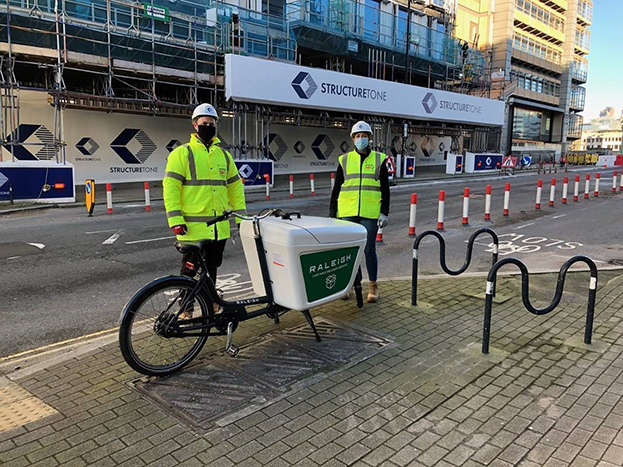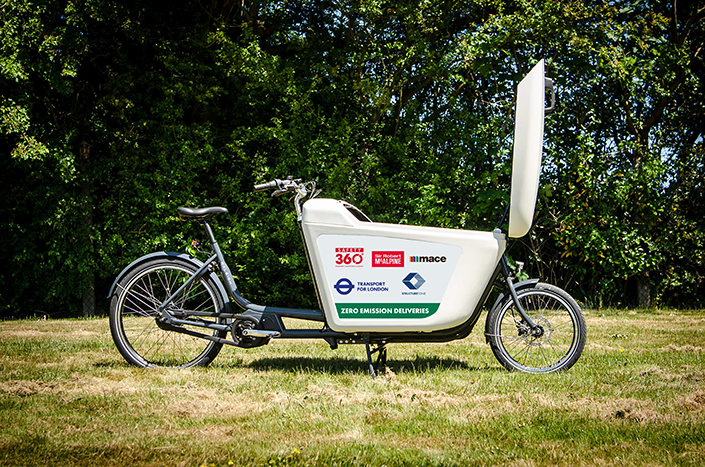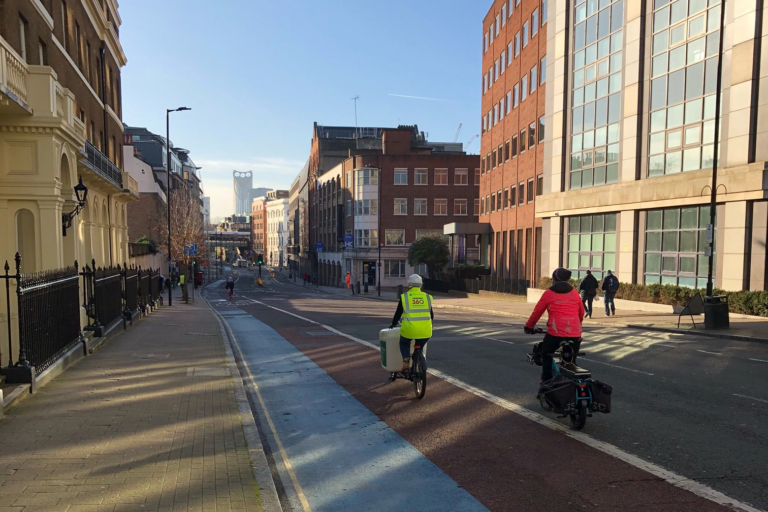With statutory regulation growing alongside investor pressure, several leading construction companies have announced net-zero targets in the past year. Such pledges are the culmination of an industry that is transitioning towards sustainability being the rule, as opposed to the exception, with BREEAM ratings, the reuse of concrete frames, high-efficiency heating and cooling systems, smart management of energy consumption, and low-greenhouse-gas construction processes becoming largely adopted on construction projects throughout London.
Despite the progress, Structure Tone London recognized that the industry cannot further decarbonize without transforming our operating systems, processes, and behaviors, and bringing employees, supply chain, customers, regulators, and communities with them every step of the way. As a result, the Structure Tone team working on the refurbishment of WPP’s Rose Court campus was tasked with finding an initiative that not only reduced emissions but also spoke to people’s hearts and minds by being a visible change they could easily contribute towards.

THE CHALLENGE
The team set up a Sustainability Task Force at the project level who canvassed opinions from the 300 people on-site for ideas and opportunities for reducing the project’s carbon footprint.
Out of 21 suggestions, the group developed a short list that consisted of:
- HGV (Heavy Goods Vehicle) holding points
- timber recycling
- materials exchange
- fairtrade canteen
- cargo bikes
Each concept was appointed a champion and developed a “benefit map” with a range of internal and external stakeholders for presentation at a “Dragon’s Den”-style (or “Shark Tank” for US TV watchers) event. In a closely run contest, the cargo bikes concept was selected.
THE TRIAL
Depending on the vehicle, cargo bikes can move up to 150kg, without the operational or environmental disadvantages associated with motor vehicles.
They bypass congestion and offer improved wellbeing for staff, all at a fraction of the overheads brought by motor, electric, or other vehicles.


This makes them a viable option alongside traditional approaches to delivering materials to urban project sites.
Structure Tone developed the initiative alongside Transport for London, London Borough of Southwark, and a collaboration of other contractors, including MaceGo to https://www.macegroup.com/sectors-and-services/consult, Sir Robert McAlpineGo to http://www.srm.com, and Wilmott Dixon. That team then partnered with bike company Raleigh to agree on the volume, weight, and shape of the cargo “hold” to make it as safe and as useful as possible.
Dedicated cycle routes were used extensively by trained couriers and lockable storage areas were provided around the city.
After months of using these bikes at Rose Court, the trial proved that cargo bikes can safely reduce up to 400 vehicle movements per day for signage, paint, electrical components, tools, waste, and documentation, saving approximately 160–320Kg of CO2 each day. That translates to 50,000Kg of CO2 over the course of the project—or up to 2,500 trees.
Numerous supply chain partners have also invested in the initiative, with companies such as Dulux, ReStyle, HSS, and Michael Lonsdale altering their processes and creating micro-consolidation and recycling centres. In addition, the Chartered Institute of Building has become a passionate advocate, running an article in Construction Manager Magazine and inviting us to speak to their members this spring.
THE RESULTS
Whilst no individual party possesses the wealth of resources necessary to manage the economic, social, and environmental challenges we face, the trial and roll-out of cargo bikes for project sites provides a blueprint for how contractors can work with statutory authorities to execute their ambitious visions. “E-cargo bikes are a key component of how we plan to create a world-class street environment in London Bridge and Southwark”, says Jack Skillen, placeshaping director for one of London’s most progressive Business Improvement Districts (BIDs), Team London Bridge. “We have been promoting the use of cargo bikes instead of motorised vehicles across a range of uses and will definitely be using Rose Court as a case study for other construction projects to follow.”
